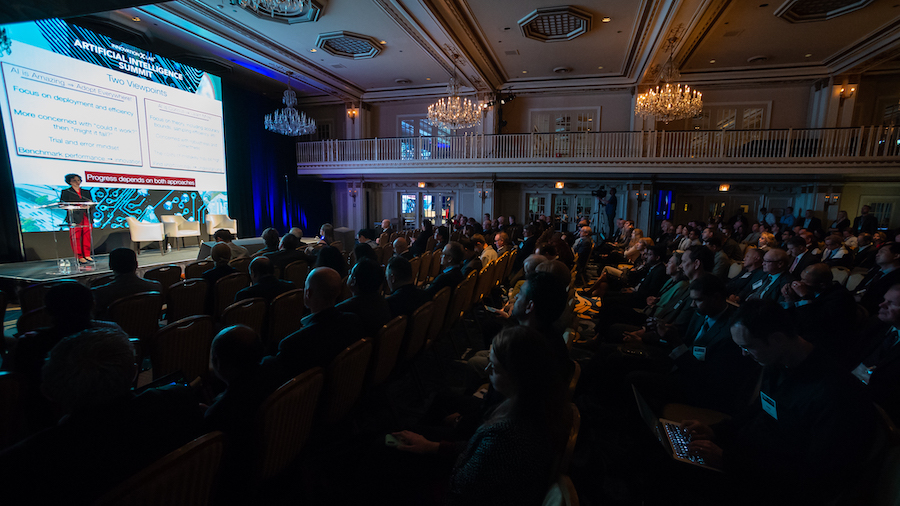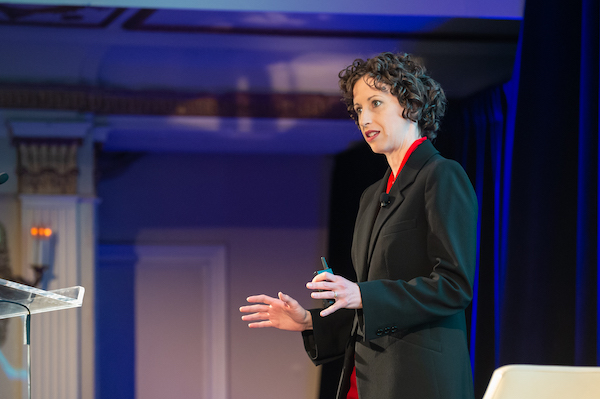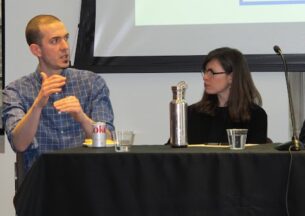Department of Energy XLab Event Features Prof. Rebecca Willett on Foundations of AI

The enormous potential of artificial intelligence has electrified industries and scientists eager to use these new technologies for commercial applications and discovery. That enthusiasm brought representatives from the private sector, government, and academia to Chicago earlier this month for the U.S. Department of Energy (DOE) Innovation XLab Artificial Intelligence Summit, a two-day event featuring speakers, panels, and demonstrations about using AI in healthcare, national security, transportation, and many other areas.
Rebecca Willett, Professor of Statistics and Computer Science at the University of Chicago, shares that excitement about AI and machine learning. But in her keynote address on the second day of the summit, she also detailed the many challenges that remain before AI can be reliably deployed for these applications — and the critical role for partnerships between industry, government, and academia in overcoming those hurdles.
In her talk, Willett first covered the many different applications that could soon benefit from the integration of AI tools, including better forecasts for weather and agriculture, optimization of energy usage and transportation in cities, and improved diagnosis and treatment of disease.
“It’s hard to imagine any aspect of our lives that’s going to remain untouched by artificial intelligence,” Willett said in her keynote, which is partially available here (skip to 1:02:00).
But Willett also stressed that we are still in the earliest stages of AI applications, and that there is much more work to be done on the foundations of these computational tools. Technologies, such as computer vision, that have achieved major advances in the past decade remain vulnerable to small perturbations — changing a few pixels can trick a system into mislabeling a panda as a gibbon, while small natural motions of a polar bear can dramatically change how well it can be identified.
The issue, Willett said, is that many of today’s AI systems “learn from examples” — the data that is fed into them — and too few examples, or examples that are insufficiently diverse, can have unpredictable impacts on how AI systems perform The experimentalist approach of trying different ideas out to see what works is excellent in low-stakes settings such as identifying animals in images on the internet, but in many emerging application domains, mistakes can be very costly financially or in terms of human wellbeing.

More foundational work is needed to improve the robustness and stability of these models, helping them avoid spurious correlations, biases, and vulnerabilities that could make them susceptible to adversarial attacks, and better incorporating physical models of the world to supplement training data. This research will help translate AI applications from the laboratory to the real world, and provide the accuracy needed to use them in contexts, such as healthcare or national defense, where failures could be catastrophic.
“The approach…is to probe these systems and try to find their shortcomings and weaknesses in the hope that, in understanding where they might fail, we can also understand how to make these systems bigger and better and more robust,” Willett said.
The event also featured participation from UChicago CS faculty Rick Stevens and Ian Foster, who lead efforts for artificial intelligence at Argonne National Laboratory. Stevens, the Associate Laboratory Director for Computing, Environment, and Life Sciences, participated in a panel on DOE partnerships with industry, while Foster, the Director of Argonne’s Data Science and Learning Division, moderated a session on using AI for discovering and developing new materials.
Additional XLab keynotes included U.S. Secretary of Energy Rick Perry, Congressmen Dan Lipinski and Bill Foster, executives from IBM and GE, and University of Chicago President Robert Zimmer, who emphasized the importance of cross-sector partnerships.
“The full impact of AI for science, both in discovery and application, will ultimately be realized only by strong ongoing collaboration between DOE labs, universities, and the private sector,” Zimmer said. “The University of Chicago’s close relationship with our affiliated laboratories, Argonne National Laboratory and Fermilab, affords invaluable opportunities for all aspects of the needed DOE/university/private sector collaborative effort to flourish. Taken together, the collective knowledge, experience, resources, and infrastructure that these relationships provide uniquely positions the City of Chicago as a growing hub in this emerging field. It is an important opportunity and indeed a responsibility that we at the University of Chicago take very seriously.”
You can also listen to Willett discussing the XLab summit and the current state of artificial intelligence on WGN Radio’s Morning Bell program. Read more about the XLab Summit at the Argonne website.












